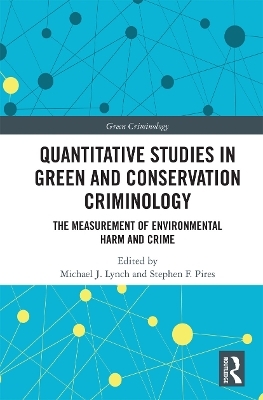
Quantitative Studies in Green and Conservation Criminology
Routledge (Verlag)
978-0-367-72712-3 (ISBN)
The book presents a valuable contribution to the areas of Green and Conservation Criminology. It will appeal to academics and students working in these areas.
Michael J. Lynch is a professor in the department of criminology, University of South Florida. He has examined green crime, law and justice issues for over thirty years, and published the first discussion of green criminology. His recent publications have appeared in Capitalism, Nature, Socialism; Ecological Economics; Global Ecology and Conservation; Society and Natural Resources; Journal of Quantitative Criminology; Theoretical Criminology; Deviant Behavior; and Sociological Spectrum, among others. He is recipient of Lifetime Achievement Awards from the American Society of Criminology Division on Critical Criminology & Social Justice, and the Division on White Collar and Corporate Crime. Stephen Pires, PhD, is an associate professor in the Department of Criminology and Criminal Justice at Florida International University. He is an expert on the illegal wildlife trade with a particular focus on commonly-poached species (i.e. hot products), illicit markets, & the organization of the illegal trade. His work has appeared in the Journal of Research in Crime & Delinquency, The British Journal of Criminology, Bird Conservational International, and Forest Policy & Economics, and has co-authored the book, "Wildlife Crime: An Environmental Criminology and Crime Science Perspective" (2018).
Foreword: Quantitative Studies in Green and Conservation Criminology, Ronald V. Clarke; Chapter 1: Why Quantitative Studies Matter in Green and Conservation Criminology. Michael J. Lynch and Stephen F. Pires. ; Chapter 2: The Branches of Green Criminology: A Bibliometric Citation Analysis 2000 – 2017. Ryan Thomson, Tameka Samuels-Jones, and Liam Downs. ; Chapter 3: Quantitative Studies in Green and Conservation Criminology: A Literature Review. Michael J. Lynch, Paul B. Stretesky, Michael A. Long and Kimberly L. Barrett.; Chapter 4: An Agenda for Criminological Investigation of Crimes Impacting Primates. Lauren Wilson and Justin Kurland.; Chapter 5: Structural and geographic features of illegal urban bushmeat trafficking. Jessica Kahler, Rachel Boratto, Liliana Vanegas, Michelle Wieland, and Meredith Gore; Chapter 6: Human-Wildlife Competition: The Role of Human Activities, Environmental Transformation, and Water Scarcity in Explaining Mammalian Species Loss. Kwan-Lamar Blount-Hill and Mangai Natarajan.; Chapter 7: Comparing and Contrasting Wildlife Seizures made at EU and US Entry Points. Daan P. V. Uhm, Stephen F. Pires, Monique Sosnowski, and Gohar Petrossian.; Chapter 8: Examining Factors Predicting the use of Wildlife Killing by the US Fish and Wildlife Service Across States. Leo Genco.; Chapter 9: The Ten-Year (1999-2008) Trend in Hazardous Waste Violations and Punishments in the United State From US EPA Resource Conservation Recovery Act Data. Michael J. Lynch. ; Chapter 10: Waste Crimes in Italy: An Empirical Exploration of their Geographic Distribution. Daniela Andreatta.; Chapter 11: Longitudinal Methods for Analyzing Green Crime. Michael A. Long, Paul B. Stretesky, and Kimberly L. Barrett. ; Chapter 12: No Longer Victorian Children: Understanding Green Victimization through an Analysis of Victim Impact Statements. Joshua Ozymy and Melissa Jarrell.
| Erscheinungsdatum | 06.04.2021 |
|---|---|
| Reihe/Serie | Green Criminology |
| Zusatzinfo | 12 Tables, black and white; 11 Line drawings, black and white; 1 Halftones, black and white |
| Verlagsort | London |
| Sprache | englisch |
| Maße | 156 x 234 mm |
| Gewicht | 460 g |
| Themenwelt | Naturwissenschaften ► Biologie ► Ökologie / Naturschutz |
| Recht / Steuern ► EU / Internationales Recht | |
| Recht / Steuern ► Öffentliches Recht ► Umweltrecht | |
| Technik ► Umwelttechnik / Biotechnologie | |
| ISBN-10 | 0-367-72712-9 / 0367727129 |
| ISBN-13 | 978-0-367-72712-3 / 9780367727123 |
| Zustand | Neuware |
| Informationen gemäß Produktsicherheitsverordnung (GPSR) | |
| Haben Sie eine Frage zum Produkt? |
aus dem Bereich


